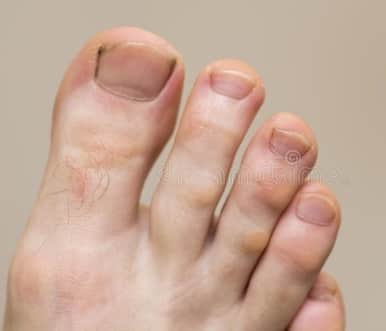podiatrist toenail fungus Specialist | toenail fungus removal | nail fungus doctor | treatment for toe nail fungus in Plano, Frisco, Allen, Mckinney, Carrolton, TX
Toenail fungus is an infection underneath the surface of the nail caused by fungi. When the tiny organisms take hold, the nail often becomes darker in color, debris may collect beneath the nail plate, and white marks may appear on the nail plate. The infection is capable of spreading to other toenails, the skin, or even the fingernails. The resulting fungal nails are thicker and difficult to trim making walking painful when wearing shoes. Toe fungus removal can be performed by a podiatrist.
If your condition is mild and not disturbing you, you may not require treatment. If your nail fungus is painful and has caused thickened nails, self-care steps and meds may help. Yet, regardless of whether treatment is effective, nail fungus regularly returns.
Nail fungus is called onychomycosis (on-ih-koh-my-KOH-sister).
When fungus infects the zones of the skin of your feet, it’s called athlete’s foot (tinea pedis).

CAUSES OF FUNGAL NAILS:
Toenails are especially vulnerable to come in contact with fungi around damp areas where you are likely to be walking barefoot, such as swimming pools, locker rooms, and showers. Injury to the nail bed may also make it more susceptible to all types of infection, including fungal infection. Those who suffer from chronic diseases, such as diabetes, circulatory problems, or immune-deficiency conditions, are especially prone to fungal nails.
Fungal nail infections are brought about by different fungi. The most well-known reason is a growth called a dermatophyte. Yeast can additionally can cause nail infections as well.
Fungal nail infection can develop in individuals at any age, yet it’s more common in adults. As the nail ages, it can get fragile and dry. The subsequent breaks in the nails allows fungus to enter. Different variables, for example, decreased blood supply to the feet and a weakened immune system, may make the nail more susceptible to being infected.
Toenail fungal infection can begin from athlete’s (foot fungus), and it can spread starting with one nail then onto the next.
SYMPTOMS OF FUNGAL NAILS:
These are some symptoms if one or more of your nails have fungus.
- Nail will be thickened.
- Discoloration, whitish to yellow brown.
- Brittle, crumbly or ragged.
- Distorted in shape.
- Nail color will be dark because of the debris present under your nail.
- Slightly foul smell.
Fungus can affect fingernails, but it is more common in toenails.
RISK FACTORS:
Factors that can increase your risk of developing nail fungus include:
- Being older, owing to decreased blood flow, more long exposure of fungi and more slow developing nails.
- Heavy sweating.
- Having a history of athlete’s foot.
- Walking shoeless in moist regions, for example, pools, gyms, and shower rooms.
- Having a minor skin or nail injury or a skin condition, for example, psoriasis.
- Having diabetes, blood circulation problems or a weakened immune system.
WHEN YOU SHOULD GO TO SEE A PODIATRIST?
You must visit your podiatrist or foot specialist to check your fungal nail if self-care steps are not working for you and your nails are getting thickened, yellowish in color, being brittle and more painful.
TREATMENT FOR FUNGAL NAILS
Treatments may vary, depending on the nature and severity of the infection. These may include prescribing topical or oral medication, and debridement of an infected nail.
Fungal nails take time to heal depending upon your severity. Even if it heals, it can happen again after some time if you are diabetic or have decreased blood circulation.
Medication involves oral and topical agents.
ORAL ANTIFUNGAL DRUGS:
These medications are frequently the best option since they clear the infection more rapidly than do skin drugs.
MEDICATED NAIL CREAM:
Your podiatric physician may recommend an antifungal cream, which you apply into your infected nails after soaking. These creams may work better if you initially thin the nails.
To thin nails, you apply a nonprescription cream containing urea. Or then again, your podiatric physician may thin the outside of the nail (debride) with a file or other tool.
best toenail fungus doctor | FUNGAL NAIL TREATMENT IN PLANO, TX:
DFW Foot and Ankle Care offers several treatment options for fungal nails, using the most advanced techniques available. Dr. Zubeen Mistry works with patients to develop a plan of action that meets the patient’s individual needs. To learn more about treatment options for fungal nails or schedule an appointment, contact our office at (469) 551-8595.
At DFW Foot Ankle Care, we treat Bunions and Hammertoes, Diabetic Foot Care, Fungal Nails, Heel Pain / Plantar Fasciitis, Ingrown Toenails, Minimally Invasive Surgery, Neuroma, Pediatric Foot Problems, Plantar Wart, Running Injuries and many more foot problems.
Same Day & Late appointments are available at DFW Foot and Ankle Care. Please call us for availability

